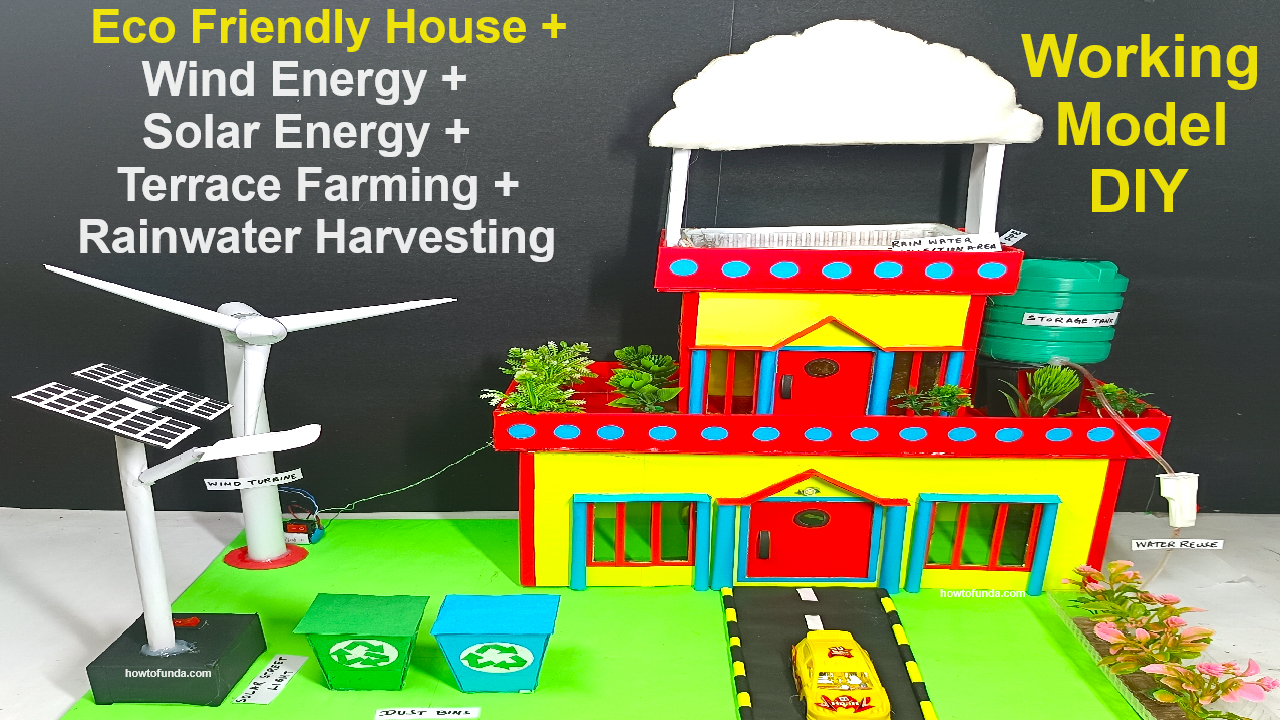Creating an eco-friendly house model with various sustainable features is an exciting project(terrace farming – rainwater harvesting – wind turbine – solar street light).
Here’s a step-by-step guide to build your model using paper, cardboard, a 9V battery, plastic trays, and other materials.

Materials Needed
- Cardboard
- Color paper
- 9V battery
- Small motor (for wind turbine)
- Small fan blades or DIY wind turbine blades
- LED light
- Small solar panel
- Plastic trays (for rainwater harvesting)
- Small water tank or bottle
- Tubing or straws (for water collection system)
- Cotton (for clouds)
- Glue
- Scissors
- Markers or paint
- Small plants or green paper for terrace farming
- Wire and connectors
- Switches (optional)
Step-by-Step Video Instructions
1. Base and House Structure
- Base:
- Cut a large piece of cardboard to serve as the base. Ensure it’s sturdy enough to support the house and other components.
- House:
- Create a two-floor house structure using cardboard. Cut out pieces for walls, floors, and the roof. Assemble and glue them together.
- Cover the house with color paper for aesthetics. Use brown or grey for the walls, green for the garden areas, etc.
2. Terrace Farming
- Terrace Setup:
- On the roof of the house, place a small cardboard box or platform to represent the terrace garden.
- Add small plants or use green color paper cutouts to simulate plants.
- You can also create small planters using cardboard and place them on the terrace.
3. Rainwater Harvesting System
- Roof and Trays:
- Attach plastic trays to the roof to collect rainwater. Ensure the trays are slightly angled to allow water to flow.
- Water Collection:
- Connect tubing or straws from the trays to a small water tank or bottle placed at ground level. This will simulate the rainwater collection process.
- Use cotton to create clouds and place them above the house. You can also sprinkle water from the clouds to demonstrate rain.
4. Wind Turbine
- Turbine Setup:
- Attach small fan blades or create turbine blades using cardboard. Attach these blades to a small motor.
- Mount the motor on a tall cardboard pole beside the house.
- Electrical Connection:
- Connect the motor to a 9V battery. Use a switch if desired for easy operation.
- Ensure the turbine blades spin when powered.
5. Solar Street Light
- Street Light Structure:
- Create a street light pole using a rolled piece of cardboard. Attach a small box or piece of cardboard at the top to house the LED light.
- Solar Panel:
- Mount a small solar panel on top of the street light or on the house roof.
- Electrical Connection:
- Connect the solar panel to a rechargeable battery or directly to the LED light if it’s powerful enough.
- Use a 9V battery if necessary to power the LED light. Add a switch for control.
6. Integration and Final Touches
- Assembly:
- Securely attach all components to the base. Ensure the house, wind turbine, and street light are stable.
- Hide any excess wires for a cleaner look.
- Decorations:
- Add additional elements like trees, cars, or pathways using cardboard and color paper.
- Use markers or paint to add details such as windows, doors, and other features.
Testing and Functionality
- Wind Turbine:
- Connect the 9V battery and observe the turbine blades spinning, demonstrating wind energy generation.
- Solar Street Light:
- Place the model under sunlight or a strong light source to charge the solar panel. Alternatively, use the 9V battery to power the LED light.
- Rainwater Harvesting:
- Pour water over the cotton clouds to simulate rain. Watch as the water flows into the plastic trays and down into the water tank.
Explanation of the Model
- Eco-Friendly House:
- Highlight how terrace farming provides fresh produce and insulation.
- Rainwater Harvesting:
- Explain how rainwater is collected and stored for future use, promoting water conservation.
- Wind Turbine:
- Demonstrate the generation of renewable energy from wind.
- Solar Street Light:
- Showcase the use of solar power to light up streets, reducing reliance on non-renewable energy sources.
By following these steps, you’ll create a comprehensive eco-friendly house model that demonstrates various sustainable practices, making it an excellent display for a science exhibition.

